Sam Fowles - MNZ Interview: Coffee Bar Kid Cuts S01 / E04: Sam Fowles
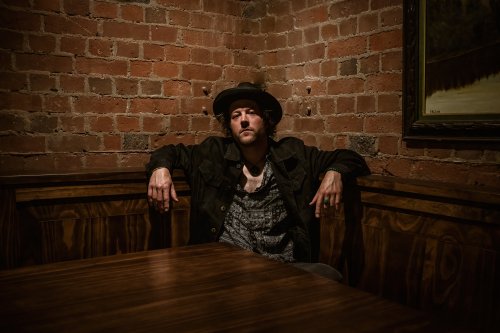
"Check out the new album cover for my new album," Te Whanganui A Tara musician Sam Fowles states on his insta. He’s over the moon about the art created by his flatmate, designer Ellie Heywood. "She literally pulled this image from my brain," he says. That is confirmed again when I chat to him about the whole process of making this collection of tunes that fall under the genre of what he describes as Psychedelic soul. "I poured my heart and soul into this. A real labour of love", he continues.
Sam Fowles likes to make music that moves not only your body but your soul and spirit, too. Speaking on the phone, in preparation for the release of his new album After Dark, he tells me that, for him, it's the stories that matter. I asked him if he’s a collector of stories and anecdotes. He says it’s often the way he writes – "I draw from my lived experience and use it as a way to help me make sense of my world. It's cathartic for me and I try to capture Important learnings that I can share. I observe and sometimes am really touched by a moment, or a vibe or just a feeling. That becomes a story for my songs, too. It’s not always a tangible thing". Like a fully blown tale of woe or happiness. "No," he says. Sometimes it’s a second-hand account from a friend that becomes the basis for a song. "It could be just the ‘moment’ or how someone recalls the time when… I’m driven by the tune, the groove of it. I’m trying to find meaning in the moments along the journey of life. A lot of songs have done that for me. That’s what I really admire about the craft."
Take Butterfly Baby, he says. This is his first single. The track is a cruisy, slightly psychedelic soul number. You might hear a likeness to Bill Withers’ Lovely Day or a bit of Hendrix from the Electric Ladyland era. “It's a song,” he says that explores the idea that if you love somebody, then set them free. “You need to cultivate their respect by accepting your lover or partner, you know, for who they are. You can’t make them something they aren’t. Possession is detrimental to a relationship,” he says.
Butterfly Baby was inspired, Fowles says, by a conversation with a friend. “He described his partner as a butterfly, you can’t catch her because if you do, you squeeze the life out of it.” So instead, his friend continues, you admire and enjoy it, leave her to come and go as it pleases. “That she was beautiful and wild and free. Choose to come and go as you please. That’s a healthy relationship,” Fowles notes, “And I think that sentiment, that moment, was a perfect analogy for a loving relationship.” This was one of several ‘moments’ that Fowles captured for the album.
He laughs. The music came from a walk around the neighbourhood. I had a musical idea, which I later worked up on my guitar. My first lyrics off the top of my head was the line “be my boomerang baby”, which I had a chuckle about knowing that it was a placeholder for what would eventually become Butterfly Baby. I was walking about coming up with the tune and the lines. I recorded them into my phone. I didn’t know that close by there’s this garage with a butterfly mural. Was that a subconscious moment? Who knows. Ha ha!”
The album was recorded at Massey Studios, engineered by different combinations of Fowles, Jonas Persson, and Ryan Prebble and later mixed by (Dr.) Lee Prebble (at his Surgery Studios), then finally and mastered by Mike Gibson (Munki Studios). “It’s an intense period that took two years to get it all right. It was a collaboration with a lot of musical friends playing in different combinations - made up of Jeremy Richardson, Dayne Robinson, Jeremiah Saolotoga and Marcus Gurtner (drums), Zane Hawkins & Jason Rapana (bass), Reuben Topzand & Hunter Paranihi (keys), Ryan Prebble, Hunter Paranihi & Fowles (Guitars), Zane Hawkins & Carlos Navae (Percussion) and BVs from Sophie Cooper, Lilla Rutherford & Tesha Riquex."
“At this time, I was studying composition and production at Massey University and was lucky enough to have access to the amazing studios there. Recording began after I had fleshed out some rough demos at home, and a lot of the composition and arrangement took place during the recording process. The tracks developed through a really iterative process, which was an epic way of exploring their sonic possibilities.”
Regular readers of Muzic.NZ may recognise Fowles’ name. He was in a band called Ghost Who Walks .“It was my first band. I was a latecomer to playing live, more a ‘bedroom musician’, And my friends encouraged me to try out open mic nights. “You need to get out of the house,” they’d say! And I met a guy there (Chris Moses) who took me under his wing and helped me form the band Ghost Who Walks. We went to Battle of The Bands and we made it to the National Finals and all.” We went on to record a four track EP which I produced myself, recorded with Lee Prebble at Surgery Studios. I had never recorded before, so it was an awesome experience to jump in there and just lay it down, you know?”
“The last iteration of Ghost Who Walks was with Henry Smithers (bass), Hunter Paranihi (guitar, keys), Reuben Topzand (keys) & Dayne Robinson (drums).We went on tour and played a couple of festivals and numerous shows around Wellington. That was a cool experience. Pretty cool first attempt.“
Commenting on his playing, he says that “I’m self-taught. I learned with my younger brother who had a natural talent to pick things up by ear, I’d be like, show me that! And I’d watch him play. He inspired me to learn by ear. We would look up guitar tabs and learn riffs from our favourite songs together. It was great to have someone to bounce ideas off through those early days. After I had been learning for a while, I then got some books to check myself and put the names to the chords and that you know, basic theory. I took a few lessons a lot later on to help me make more sense of it. Hendrix was a massive inspiration, that RnB style. Rhythm guitar played like a piano for example. As well as his bluesy style. I tried to emulate that. My style started there but then other influences came in. So, I didn’t really have any rooted style as it were. But it was when I studied music at Massey that I really took off. But it was in my third year at Uni that, well, my grandfather passed away and things got busy, so I pressed pause on Ghost Who Walks."
"I wrote a 4-track demo (as part of my Uni project)," he continues, "I started with a blank canvas, and I thought I’ll just write 4 songs, see what happens. It wasn’t for the band. There was no intention for it. Not like “I’m gonna make this”. I just gonna make something. Out of this came the basis of my solo project. I felt I’d got something. It was a creative switch for me. I experimented with the combination of synths and guitars. I wanted to make something that felt nostalgic. But. Modern, too. The mixture of both, modern production style. But the elements are nostalgic. A papier-mâché of influences.”
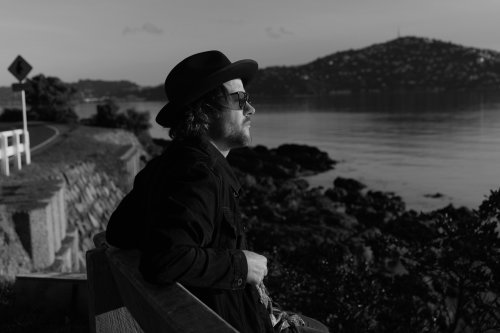
Along the way, Fowles had some great mentorship from notable Kiwi artists like Warren Maxwell (whilst Fowles was at Massey University) and Barnaby Weir (The Black Seeds). “Barnaby was also co-producer for me.”
How did he meet Barnaby Weir? “Well, we (Ghost Who Walks) were playing a gig up at Foxton beach – with Barnaby Weir and ‘friends’. We were like “you guys are legends”. We were in awe. We did a soundcheck and he was like “sounds mean, boys!”, you know? And we did the gig. Everyone went home and me and Barnaby just hung out with our partners, and he invited me to come down and play at an open mic at his family bar, Poquito, in Tory St. It was part of their songwriter sessions. It was a great community of songwriters. He introduced me to that. And we’d talk about the songs afterwards. He would offer me pointers, looking to help, etc. I talked to him about making an album. I was studying at Massey, and we had access to the studio and the rest is history.”
“Barnaby was great, helping me understand how to get the sound that I was going for. It's like he knew what I was aiming for, and he really helped me nail down what that was. We started recording in December of 2021 we did five songs live with the band and the other five songs were more produced. I would take the basic recordings and go away and experiment with different overdubs and then Barnaby and I would listen together and decide what was working and what wasn’t. We did this until we arrived at versions of all the tunes that we were both happy with.”
Speaking about his writing process, Fowles has said that he likes to use Bowie’s ‘cut up technique’, writing lines down then mixing them up in different configurations. Fowles told me this is quite a liberating approach, kind of freeing the mind from the hard and fast decisions of the original written order. In that way he managed to get the lines in the ‘right order’.
The inspiration for Slipping Away came from an afternoon jam session at a mate’s place. “We were just bumming around. My mate came outside and said “Bro, that’s a Tune. We should definitely work that up into something! So, we did.”
“The intro is kind of artistic. I got experimental. It’s a kind of visceral way to open it, having the track filtered out and fading in mixed with the found water sounds. To me it sounds like the song is submerging from the water as it were. The song is me reflecting on inner struggles, you know? A lot of my writing is introspective. I try to tease the good out of the bad situation. Seek out the universal truths...Even if all there is in a situation is a lesson.”
Fowles is a big believer in getting the vibe right. Travel, whether it be physical or in the mind or soul is prominent in his music. Destination Unknown came from a time in my life when I was struggling with direction, waiting for something that would define me. I found myself waiting, you know for a moment or a big thing to happen, but I realised that I was missing the most important it, the journey - I keep thinking.
I would be happy when I got there or achieved that wherever that was. The second layer to this was trying to find my purpose. You’ve got that compass, you know? You need to trust it, listen to that, not blank it out. You need to let your heart guide you and that’s what I should have been doing, instead of being in this cycle of looking for a destination you never truly arrive at. You know, you have to enjoy it. Life is a journey. Not a destination.”
The fourth single is Sitting On Top of The World. Lyrically, Fowles tells me, it explores mental health, the inner turmoil. “A sort of love letter to the self”, he says, “To be patient. Be kind to yourself, especially when you are feeling low down and that. ”He’s a great one for getting out into nature when this happens. Be grounded in the present moment. Show yourself some love.”
“At the beginning of the song is bird life that I went out and captured recordings of around Otari-Wilton and Takarunga/Mt Victoria and what I could hear from my flat in Newtown.” He says he loves “nerding out on sounds, recordings like this.” It’s how he connects with nature and brings that into his recordings. Another moment to stop, smell the roses, listen, and sing along.
After Dark is out on 15 November 2024
Sam Fowles with full band will be playing a San Fran, Wellington on 5 December 2024
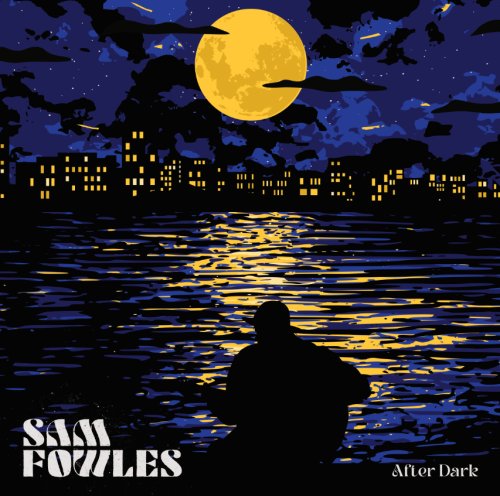
About Sam Fowles

Fowles would describe his music as psychedelic soul laced with blues and funk. It resonates with deep grooves and driving rhythms created by vintage drum sounds, digital sonics, and electric guitars that build and blaze into billowing soundscapes. At its core is his unique, soulful voice and the punchy, heartfelt lyrics he wears on his sleeve.
Fowles writes about the wars we fight in our hearts and minds. As someone who has seen struggles, who has overcome and risen above them, his conscious lyrics traverse the spectrum of love and loss; light and dark; personal triumphs and failures. While his journey is his own, his message is universal. Ultimately, it’s a message of hope.
Visit the muzic.net.nz Profile for Sam Fowles
Releases
Other Interviews By Tim Gruar
 MNZ Interview: Coffee Bar Kid Cuts S01 / E06: Electric Tapestry
MNZ Interview: Coffee Bar Kid Cuts S01 / E06: Electric Tapestry
06 Jan 2025 // by Tim Gruar
Photo: Finn Zemba Just prior to Christmas Muzic.NZ's Tim Gruar dialled up Te Whanganui a Tara based five-piece Electric Tapestry to have a bit of a korero over MS Teams about the band’s evolution, DIY recording in a leaky chapel and songwriting about space and toxic masculinity.
Read More...
 Dillastrate - MNZ Interview: Coffee Bar Kid Cuts S01 / E05: Dillistrate
Dillastrate - MNZ Interview: Coffee Bar Kid Cuts S01 / E05: Dillistrate
16 Dec 2024 // by Tim Gruar
Otautahi outfit Dillastrate intend their mahi to be a “movement to uplift and amplify Te Reo Maori and Te Ao Maori through music using a unique blend of genres.” They wear their kaupapa on their sleeve in the writing of their new album Nga Pounamu.
Read More...
 MNZ Interview: Coffee Bar Kid Cuts S01 / E03: Kirsten Morrell
MNZ Interview: Coffee Bar Kid Cuts S01 / E03: Kirsten Morrell
14 Oct 2024 // by Tim Gruar
Kirsten Morrell is possibly one of the most delightful and charming people in music that I have even interviewed. She was so generous with her time.
Read More...
03 Oct 2024 // by Tim Gruar
APRA Award-winning composer and saxophonist Louisa Williamson is a ‘Jack’, or rather ‘Jill’, of many trades – a composer, a jobbing session and live musician, a teacher of music and a band leader. Her CV features gig-time and recording credits with local big-hitters such as L.
Read More...
 MNZ Interview: Coffee Bar Kid Cuts S01 / E01: Womb: Sibling Harmony
MNZ Interview: Coffee Bar Kid Cuts S01 / E01: Womb: Sibling Harmony
12 Aug 2024 // by Tim Gruar
Later this month Eyegum Collective’s magnificent Great Sounds Great Festival returns for a third year with bands known and unknown, including Jujulipps, Grecco Romank, Ebony Lamb, Death and The Maiden and Fur Patrol. The one-day multi venue event has moved to a new date in late August, to add some welcome warmth to the dreary Capital winter months.
Read More...
Most Viewed Artists
Latest Galleries
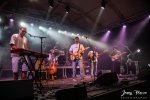
Evan Rhys & the Stereo Streets @ Festival of Lights - Pukekura Park, New Plymouth - 18/01/2025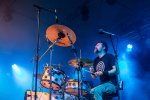
Midwave Breaks @ Festival of Lights - Pukekura Park, New Plymouth - 18/01/2025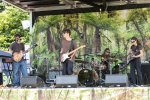
Rumpus Machine @ Music in Parks, Aotea Square, Auckland - 18/01/2025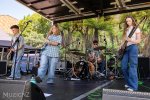
Fan Club @ Music in Parks, Aotea Square, Auckland - 18/01/2025
NZ Top 10 Singles
- APT.
ROSÉ And Bruno Mars - DIE WITH A SMILE
Lady Gaga And Bruno Mars - BIRDS OF A FEATHER
Billie Eilish - TASTE
Sabrina Carpenter - I LOVE YOU, I'M SORRY
Gracie Abrams - ESPRESSO
Sabrina Carpenter - SAILOR SONG
Gigi Perez - LOSE CONTROL
Teddy Swims - A BAR SONG (TIPSY)
Shaboozey - GOOD LUCK, BABE!
Chappell Roan





 Report A Problem
Report A Problem

